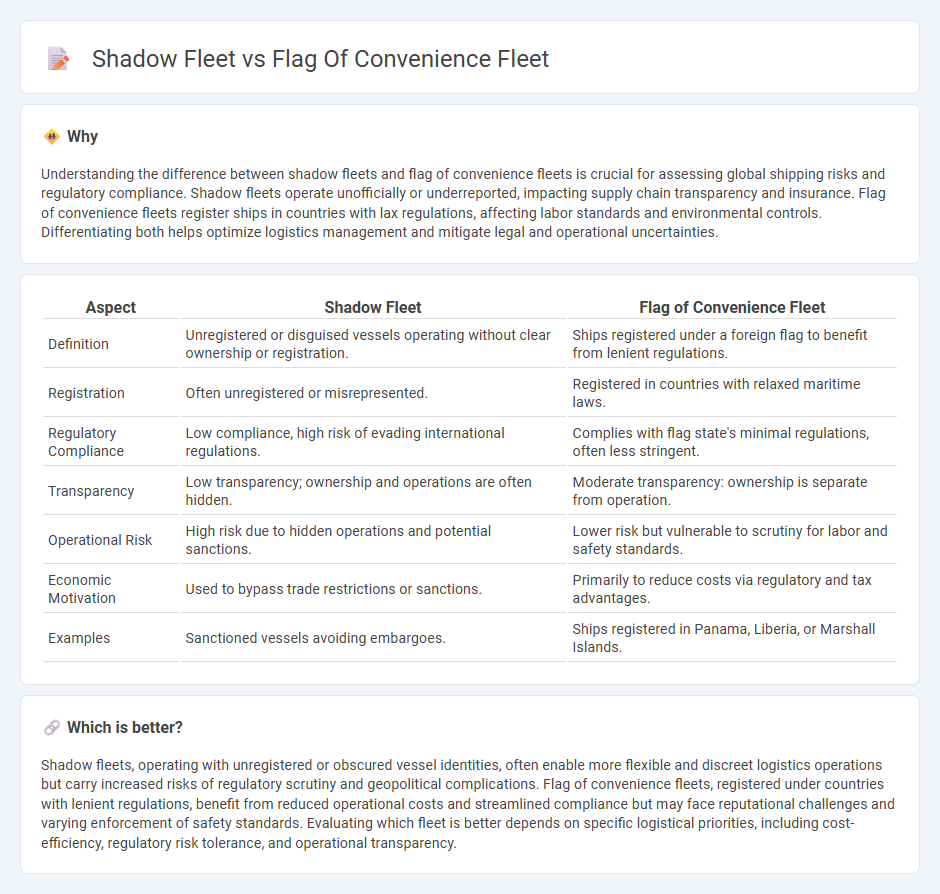
Shadow fleets operate with unregistered or concealed vessels to circumvent regulations and sanctions, often complicating tracking and accountability in global shipping. Flag of convenience fleets use ships registered under foreign flags to benefit from lenient regulations, reduced costs, and weaker enforcement on safety and labor standards. Explore the distinctions and regulatory challenges between these two maritime practices to understand their impact on international trade and security.
Why it is important
Understanding the difference between shadow fleets and flag of convenience fleets is crucial for assessing global shipping risks and regulatory compliance. Shadow fleets operate unofficially or underreported, impacting supply chain transparency and insurance. Flag of convenience fleets register ships in countries with lax regulations, affecting labor standards and environmental controls. Differentiating both helps optimize logistics management and mitigate legal and operational uncertainties.
Comparison Table
| Aspect | Shadow Fleet | Flag of Convenience Fleet |
|---|---|---|
| Definition | Unregistered or disguised vessels operating without clear ownership or registration. | Ships registered under a foreign flag to benefit from lenient regulations. |
| Registration | Often unregistered or misrepresented. | Registered in countries with relaxed maritime laws. |
| Regulatory Compliance | Low compliance, high risk of evading international regulations. | Complies with flag state's minimal regulations, often less stringent. |
| Transparency | Low transparency; ownership and operations are often hidden. | Moderate transparency: ownership is separate from operation. |
| Operational Risk | High risk due to hidden operations and potential sanctions. | Lower risk but vulnerable to scrutiny for labor and safety standards. |
| Economic Motivation | Used to bypass trade restrictions or sanctions. | Primarily to reduce costs via regulatory and tax advantages. |
| Examples | Sanctioned vessels avoiding embargoes. | Ships registered in Panama, Liberia, or Marshall Islands. |
Which is better?
Shadow fleets, operating with unregistered or obscured vessel identities, often enable more flexible and discreet logistics operations but carry increased risks of regulatory scrutiny and geopolitical complications. Flag of convenience fleets, registered under countries with lenient regulations, benefit from reduced operational costs and streamlined compliance but may face reputational challenges and varying enforcement of safety standards. Evaluating which fleet is better depends on specific logistical priorities, including cost-efficiency, regulatory risk tolerance, and operational transparency.
Connection
Shadow fleets consist of vessels operating under flags of convenience to exploit lenient regulations and reduced scrutiny, enabling cost savings and operational flexibility. Flags of convenience registries often obscure ownership and bypass stringent maritime laws, making shadow fleets integral to complex global logistics networks. This connection challenges regulatory oversight and impacts supply chain transparency in international shipping.
Key Terms
Ship Registration
Flag of convenience fleets operate under registries of countries with lenient regulations, allowing shipowners to benefit from reduced taxes and relaxed labor laws, which often raises concerns about safety and environmental standards. Shadow fleets consist of vessels cloaked in obscurity through complex ownership structures and deceptive registrations to evade sanctions or scrutiny, complicating maritime governance and enforcement efforts. Explore detailed insights on ship registration practices and their impact on global maritime operations.
Ownership Transparency
Flag of convenience fleets operate under registries of countries with lenient regulations, often obscuring true ownership due to complex corporate structures. Shadow fleets use similar tactics but frequently involve more covert arrangements, increasing challenges in tracing actual owners and identifying links to sanctions evasion. Explore deeper into ownership transparency issues to understand their implications on maritime security and global trade.
Regulatory Compliance
Flag of convenience fleets operate under foreign registries to benefit from lenient regulatory standards, often resulting in reduced oversight on safety, labor conditions, and environmental compliance. In contrast, shadow fleets, typically unregistered or disguised vessels, evade international regulations altogether, posing significant challenges to maritime authorities in monitoring and enforcement. Explore further to understand how regulatory frameworks address these complex maritime compliance issues.
Source and External Links
Flags of Convenience Dominate Maritime Freight - Statista - In 2022, ships registered under three main flags of convenience--Panama, Liberia, and the Marshall Islands--accounted for 44.3% of the world's cargo capacity, far surpassing national fleets like China's 5.2% share.
The IMO: Why it is Important and What does it do? - Nautilus Shipping - A flag of convenience means ships are registered in countries different from their owners' nationality to benefit from lower fees, fewer regulations, and reduced taxes, significantly shaping global shipping with over half of the world's merchant fleet operating under such flags.
Flag of convenience - Wikipedia - Flags of convenience are used by shipowners to reduce operating costs by registering ships under countries with open registries, allowing them to bypass stricter national labor, environmental regulations, and taxation, thereby lowering their transportation costs significantly.
 dowidth.com
dowidth.com